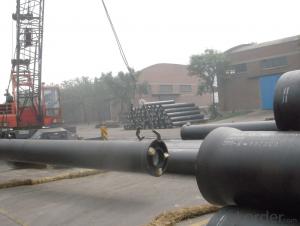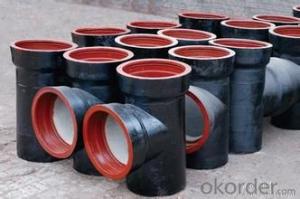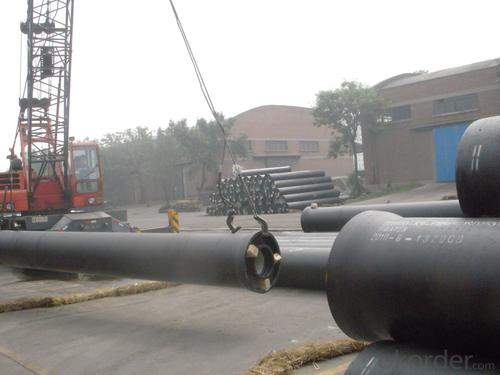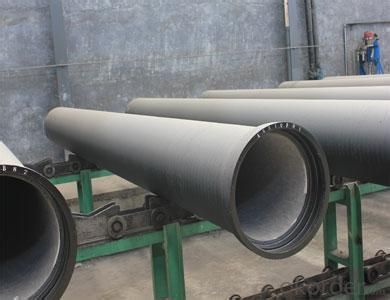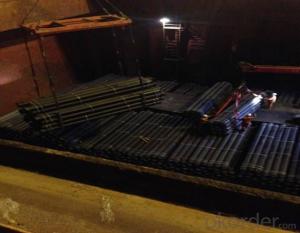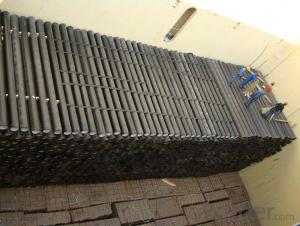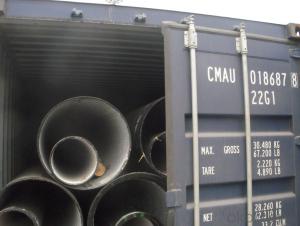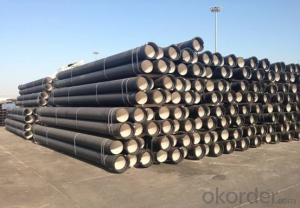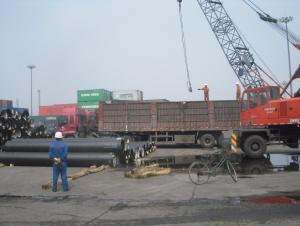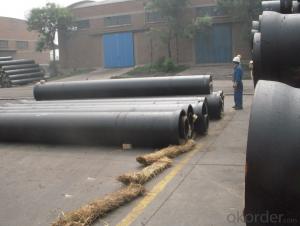DUCTILE IRON PIPES K8 DN500
- Loading Port:
- China Main Port
- Payment Terms:
- TT OR LC
- Min Order Qty:
- -
- Supply Capability:
- -
OKorder Service Pledge
OKorder Financial Service
You Might Also Like
Ductile Iron Cast Pipe is without any defects compare with tradition casting tech, which has many advantages particularly as follow:
(1) High density. In the "vertical upward casting" process, the melt iron of centre liquid column in center crystallizer is continuously feeding for volume shrinkage caused by condensation tube at outer circumference , which lead to be free of shrinkage porosity.
(2) High purity. When melt iron pouring, the mixed impurities such as gas, dross, sand grain which are lighter than melt iron could be eliminated at furnace mouth, its impossible to enter into the crystallizer through the channel, so the melt iron into the crystallizer is very pure.
(3) Strength with toughness. The cooling speed provided by continuous crystallizer is 30 times than sand casting and 5 times than centrifugal casting, and doesn't produce white iron, the eutectic cell volume of continuous cast iron is one eighth to one tenth compare with traditional cast iron. The density of graphite nodule in ductile iron can reach 300-700 pcs/mm2. Therefore, all reason above improve the strength and toughness of continuous cast iron.
(4) Free machining. The high speed cooling make the hardening phase (such as boride, steadite) not appear like reticular, massive or thick, but diffuse like fish bone and pane in shape, moreover, there are tiny graphite flakes inlaid hardening phase. It's free machining in BrinellHardness the range of 250-300HB. However, the Brinell Hardness of 250 is top limit to common metal materials.
(5) Uniform composition of tube wall. The convection mixing of liquid column caused by marching type drawing in crystallizer make the composition of tube wall well-distributed, and concentration gradient very little.
(6) High productivity. To the wall thickness of tube under 10mm, the speed of continuous casting is 1 meter/min, to the wall thickness of tube under 20mm, the speed of continuous casting is 0.5 meter/min, which is high efficiency that centrifugal or other casting tech couldn't reach.
- Q: Why is the sound speed of nodular cast iron lowered after heat treatment?
- This may be the material microstructure changes after heat treatment, is generally the pearlite content increased, the available change heat treatment and then check the corresponding microstructure and corresponding measuring sound velocity adjustment, such as annealing, normalizing etc..
- Q: Can ductile iron pipes be used in areas with high levels of hydrogen sulfide gas?
- Yes, ductile iron pipes can be used in areas with high levels of hydrogen sulfide gas. Ductile iron pipes have a high corrosion resistance, which makes them suitable for such environments. Additionally, they have been successfully used in sewage systems and wastewater treatment plants where hydrogen sulfide gas is commonly present.
- Q: What is the typical weight of ductile iron pipe?
- The typical weight of ductile iron pipe can vary depending on its diameter and wall thickness. However, as a general guideline, a 6-inch diameter ductile iron pipe with a wall thickness of 0.25 inches may weigh around 35 pounds per linear foot. Similarly, a 12-inch diameter ductile iron pipe with a wall thickness of 0.375 inches could weigh approximately 115 pounds per linear foot. It is important to note that these weight estimates are approximate and may vary slightly depending on the specific manufacturer and product specifications.
- Q: Are ductile iron pipes suitable for installation in rocky or hard soil conditions?
- Ductile iron pipes are a great choice for rocky or hard soil conditions. They are known for their strength and durability, which makes them perfect for challenging soil conditions. These pipes have a high tensile strength, allowing them to handle external loads and pressures, even when there are rocks or hard soil present. Furthermore, they are resistant to corrosion, making them even more suitable for installation in such conditions. The pipes' flexibility and ability to withstand bending stresses also make them reliable for rocky or hard soil conditions, as they can adapt to ground movement without compromising their structural integrity. Overall, ductile iron pipes are the preferred option for installations in challenging soil conditions because of their robustness, longevity, and resilience.
- Q: What is the weight of ductile iron pipe compared to other pipe materials?
- Compared to other pipe materials, ductile iron pipe typically carries more weight. The weight of the pipe may differ depending on its size and thickness, yet in general, ductile iron pipe is more compact and has a greater weight per unit length than materials such as PVC, HDPE, or steel. The main reason for this increased weight is the composition of ductile iron pipe, which consists of iron and carbon, rendering it a robust and resilient choice for a range of piping purposes.
- Q: Can ductile iron pipes be used for water treatment plants?
- Yes, ductile iron pipes can be used for water treatment plants. Ductile iron pipes have excellent corrosion resistance and durability, making them suitable for transporting water in water treatment plants. Additionally, their high tensile strength allows them to withstand the high pressures often found in these facilities.
- Q: How is ductile iron pipe different from other types of pipes?
- Ductile iron pipe is different from other types of pipes in several ways. Firstly, ductile iron pipe is known for its exceptional strength and durability. It is made from a unique composition of iron, carbon, and other alloying elements, which gives it superior mechanical properties compared to other types of pipes. This makes ductile iron pipe highly resistant to external forces and pressure, making it ideal for underground installations, water mains, and sewer systems. Secondly, ductile iron pipe has excellent corrosion resistance. It is typically lined with a cement mortar or an internal coating, which provides a protective barrier against corrosion and extends the pipe's lifespan. This makes ductile iron pipe highly suitable for carrying water and other fluids, as it prevents contamination and maintains the quality of the transported material. Furthermore, ductile iron pipe offers a high degree of flexibility. Unlike more rigid pipe materials like cast iron, ductile iron pipe has the ability to withstand moderate deflection and ground movement without breaking or cracking. This flexibility makes it less prone to failure and reduces the need for costly repairs or replacements. Lastly, ductile iron pipe is relatively easy to install and maintain. It is typically available in long lengths, which minimizes the number of joints required. Additionally, the pipe's mechanical properties and corrosion resistance make it less susceptible to damage during installation or operation, resulting in lower maintenance costs over time. In conclusion, ductile iron pipe stands out from other types of pipes due to its exceptional strength, corrosion resistance, flexibility, and ease of installation. These qualities make it a reliable and cost-effective choice for various applications, especially in the water and wastewater industry.
- Q: What is the DN400 installation charge for ductile iron pipes?
- Labor cost: refers to the total amount of wages according to the provisions of the payment to the construction and installation works in the production of workers and ancillary production units of workers costs.
- Q: How do ductile iron pipes perform in freeze-thaw cycles?
- Ductile iron pipes demonstrate exceptional performance in freeze-thaw cycles due to their material properties. With high tensile strength and excellent impact resistance, ductile iron is highly resistant to the stresses caused by freezing and thawing. Unlike other materials, these pipes can withstand the expansion and contraction during temperature changes without cracking or breaking. One of the primary reasons for the success of ductile iron pipes in freeze-thaw conditions is their capacity to absorb and dissipate stresses. The material's high ductility allows for slight deformation under stress, releasing pressure and preventing pipe damage. This characteristic ensures that the pipes can endure repeated freezing and thawing cycles without compromising their structural integrity. Furthermore, ductile iron pipes feature a durable and protective coating, such as cement mortar lining or polyethylene encasement, which further enhances their resistance to freeze-thaw cycles. These coatings offer an extra layer of protection, preventing direct contact between water and the iron and reducing the risk of corrosion. Moreover, ductile iron pipes have an extended service life, often exceeding 100 years, thanks to their inherent strength and resistance to various environmental factors, including freeze-thaw cycles. The pipes' ability to endure these cycles without significant damage ensures the reliability and durability of water distribution systems, even in regions prone to freezing temperatures. In conclusion, ductile iron pipes are highly dependable and excel in freeze-thaw cycles. Their high tensile strength, impact resistance, capacity to absorb stresses, and protective coatings make them the preferred choice for water distribution systems in areas with harsh winter conditions.
- Q: How do ductile iron pipes handle pipe deflection?
- Ductile iron pipes possess exceptional strength and flexibility, enabling them to effectively handle pipe deflection. Pipe deflection, referring to the bending or curving of a pipe from its original straight alignment, is easily managed by ductile iron pipes. When external forces such as soil movement or heavy loads are applied, ductile iron pipes possess the ability to flex and adapt without fracturing or breaking. This remarkable capability is a result of their unique composition, which includes nodular graphite inclusions that provide excellent ductility. The flexibility of ductile iron pipes allows for the absorption and even distribution of stress along the pipe wall, preventing concentrated points of strain that could lead to failure. This characteristic enables the pipes to accommodate ground movement, settlement, and other external factors that may result in deflection. Moreover, ductile iron pipes possess a high modulus of elasticity, ensuring they can endure significant deformation before reaching their ultimate limit. This property ensures the pipes maintain their structural integrity even when subjected to substantial deflection. Additionally, the joint system utilized in ductile iron pipe installations contributes to their ability to handle pipe deflection. The restrained joint design guarantees a tight and secure connection between pipe sections, reducing the potential for joint separation or leakage caused by deflection-induced stress. All in all, ductile iron pipes exhibit excellent resistance to pipe deflection. Their flexibility, high modulus of elasticity, and dependable joint system make them the preferred choice for a wide range of applications, including water distribution, wastewater management, and sewer systems.
Send your message to us
DUCTILE IRON PIPES K8 DN500
- Loading Port:
- China Main Port
- Payment Terms:
- TT OR LC
- Min Order Qty:
- -
- Supply Capability:
- -
OKorder Service Pledge
OKorder Financial Service
Similar products
Hot products
Hot Searches
Related keywords
